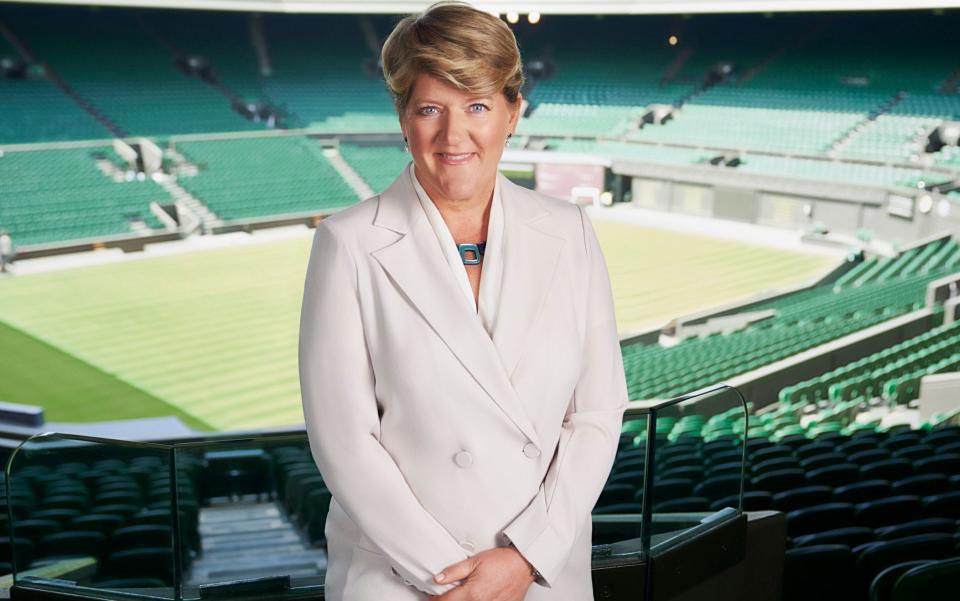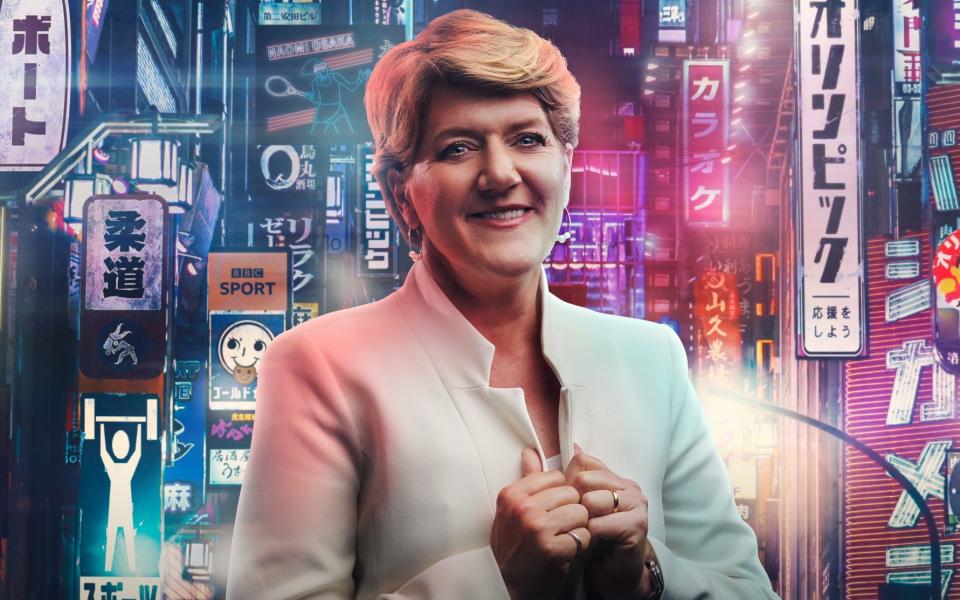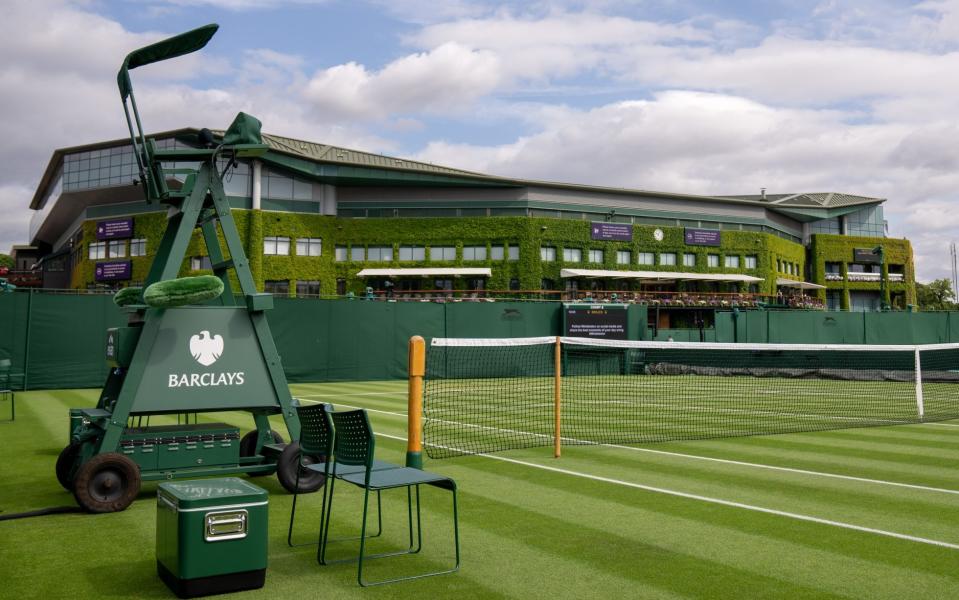Clare Balding interview: ‘I very nearly killed Princess Anne but I think she’s forgiven me’

This summer, Clare Balding will be busier than a dozen busy people. She will be presenting television coverage of Wimbledon, hosting the BBC’s nightly dispatches from the Paris Olympics, fronting the Paralympics for Channel 4. It is a schedule exhausting in its scale. Not that life is ever quiet around Clare Balding.
This weekend, she is playing in a golf competition on Saturday and is off to address the Cambridge Literary Festival on Sunday. And her mother is about to pop round for lunch.
In between she has found time to speak over Zoom from the neat, smart kitchen of the house in west London that she shares with her wife, the former BBC radio continuity announcer Alice Arnold. But before she can get started talking about her life and work and explaining the new initiative she is involved in, trying to get more of us Britons to play tennis, she has a domestic issue to sort out.
“Button: stop it. Get down!” she calls out. “Stop it Button. I’m so sorry. That’s our cat destroying a bag of food she obviously thinks she deserves.”
She goes off camera for a moment. Then returns with a smile. “Where were we?”
Button, meanwhile, suitably chastised, appears to have given up her bold attempt to secure an early lunch. Balding’s is among the most authoritative voices in Britain. When she appears on television or radio, the nation, like Button, stops and listens. We listen because she is always in complete control of her subject, we listen because she knows what she is talking about, we listen because she exudes an infectious warmth and passion. And we listen because, invariably, she asks the right questions.
“One thing I will never ask is: how does that feel?” she says. “Interviewers ask it all the time. And it’s pointless because after someone’s just won at Wimbledon or at the Olympics they just feel knackered. They don’t have anything coherent to say about their feelings because they haven’t formulated them yet. So ask them something that might produce a good answer.
“I remember I interviewed the Duke of Edinburgh for his 90th birthday,” she continues, barely missing a beat. “I got the job at quite late notice and it was terrifying. I was prepping, doing my homework and I knew not to ask him what he feels. You could ask him what he thinks because he had thoughts about a lot of things. But how he feels? You can imagine the response. It came to my first question, and I had to fight this sudden urge to say: so your royal highness, how does it feel to turn 90…”
Accomplished as she is, Balding, 53 never thought she was going to be a television figure. She was born into a racing dynasty, her father Ian was the Queen’s trainer and Her Majesty would regularly pop by at the yard in Kingsclere, Hampshire to inspect her horses, often enjoying breakfast with the family.
Horses were what mattered in the Balding home, her brother Andrew followed her father to become a trainer. And in her autobiography, she jokes that 1971 was remembered in family circles as the year Mill Reef, the legendary champion Balding Senior trained, won the Derby rather than the year she was born. Growing up immersed in the sport, if there was any assumption made about her future it was that it would be aboard a horse. Indeed she spent much of her youth competing as an amateur jockey.
“I remember Dad telling me I’d have to fall off 100 times before I’d be a proper jockey,” she says. “That was a big lesson. I used to go out and fall off on purpose. I got to that 100 in about 10 days. And he was right, it does make you a better jockey. You’re definitely less fearful about falling off.”

Between falls off her horse, Balding was very good at school, sharp, inquisitive, hardworking. Despite once being suspended for shoplifting, she became head girl of Downe House in Berkshire, where she was a contemporary of the comedian Miranda Hart. She went on to read English at Cambridge and, while still competing as an amateur jockey, won a place on the BBC Graduate Trainee Scheme. And it was then that she had an encounter with her broadcasting hero Terry Wogan which altered the direction of her life.
“I wrote to him when I was 13 and asked for a signed photo, which he sent me,” she recalls of Wogan. “I actually got to meet him at a charity cricket match and he was so charming and lovely, so nice to everyone around him. Then I was asked to do an interview on his show Auntie’s Sporting Bloomers and I told the story of nearly killing Princess Anne.”
Hang on a minute, she nearly killed Princess Anne?
“Well, it was in a race when I’d only been competing for a couple of years,” she explains of her days as a jockey. “I got in her path, we collided and she was nearly unseated. I think she’s forgiven me. She knows I didn’t do it on purpose. Funnily enough, when she gave me my CBE, having previously presented me with an OBE, she leaned over and said: ‘Mmm, I think we’ve been through this before.’”
The day after she had told her tale of a brush with royalty on Wogan’s sofa, Balding took a call from a producer at BBC Radio 4. “She said she’d seen me on Wogan and would I like to present a walking show they’d got planned? Twenty-five years later I’m still presenting Ramblings. So I have Terry to thank for that. Such a beautiful human being.”
As the many fans of Ramblings will know, on it Balding goes out for a long hike through the countryside of at least six miles (her longest is 14) accompanied by a guest. Over the years, she has walked with politicians, authors, naturalists, scientists, chatting as they go. And their conversation is always illuminating, interesting, listenable.
“Like you see me now,” she says, pointing to her cheek. “I don’t wear a stitch of make-up, I’m in my walking boots, waterproofs, my lovely producer Karen carries the mic and off we go. When you’re out there a few hours just talking in nature, people start to reveal themselves.”
But they also reveal themselves because of the interviewer. Balding puts people at their ease. In part it is her energy, her enthusiasm, her tiggerish nature. But it is also her knowledge, accrued through hours of research on every subject she ever encounters. As she speaks, she pulls from her bookshelves some of her numerous notebooks. There is one for cycling, one for Olympic history, another for swimming. Each one is neatly labelled (this is one of nature’s perennial head girls). One says: “Things Not To Say Live on Air”.
“It’s a reminder to me that you don’t have to say everything you know,” she says of her book. “You have an expert there, let them speak. But I love nerdy stuff, and because the researchers are so good at the BBC, we have nerd offs. I ask them things they know no one else will. They like that I like that stuff. And like athletes do with visualisation, this material is really useful in thinking through what might happen before you do a broadcast.”
Her preparation – and the ease of her delivery – got her noticed. She landed jobs on Radio 5, she presented the religious show on Radio 2 on Sunday mornings, she worked for the Evening Standard and the Observer writing – beautifully – about racing, she was part of BBC television’s racing team. An unabashed dog lover, she even landed the job presenting Crufts on Channel 4. But it was London 2012 when she presented the swimming coverage for the BBC, that really projected her on to the national consciousness.
“I wasn’t a main presenter, so you either feel narked or go: right, this is the only home Olympics I ever will work on, I will throw myself into it. I will tell the story about swimming better than it has ever been told and make you care.”
She certainly did that. There was one interview she conducted which summed up the spirit of the whole event, when she invited the father of the surprise South African gold medallist Chad le Clos to share his thoughts on his son’s performance.
“Look at my boy, unbelievable, look at him,” she says, perfectly mimicking Burt le Clos’s passionate South African tone. “I had seen Burt in the stands going mad when his boy won. He and his family were the only people in the whole stadium celebrating. I wanted to hear his story.
“I had to convince the producer it was worth doing. Which was a risk because I didn’t know he was worth doing. But he leapt through the television and connected with everyone.”
After 2012 and her encounter with Burt, she was given a chat show by the BBC in 2015, she covered the Boat Race, she was Radio 5’s woman at Wimbledon. For a while, it seemed, she was everywhere. And apparent ubiquity brought an inevitable backlash.
“People think I do more than I actually do,” she says. “I do a lot of different things, but I’ve only been on television five times this year.”
Still, with the scrutiny has come the personal criticism. Television is a visual medium and how she looks is part of the critique. “I am really careful about social media,” she says. “I don’t look at it when I’m doing major events. I just don’t need to know whether somebody likes or doesn’t like what I’m wearing or whether they think I should get my hair cut or whether I’ve put on weight. Seriously, I don’t need to know.”
The audience’s response to what she says, however, she takes very seriously. In 2009, when she was the course-side interviewer at the Grand National, she asked the winning jockey Liam Treadwell if he was going to spend his prize money on having his teeth repaired. She was widely chastised: posh Clare condescending to a toothless Irishman.
Although Treadwell cheerfully forgave her (indeed he thanked her when, as a result of the furore, a dentist gave him a free set of new teeth) she was hollowed out by the swell of complaint.
“I did an awful thing and I genuinely didn’t mean any harm. I was probably just trying to be funny and I misjudged it completely,” she says.
In 2020, Treadwell died from an accidental drug overdose. And mention of his name makes her pause for a moment, the tears beginning to well. “You know, obviously, what’s happened since makes it very difficult to talk about. Liam’s mum and I are in touch fairly regularly. Sorry, I just can’t believe he’s not here.”
Though she was hurt by it, and momentarily stalled by the response, the incident did not challenge her enthusiasm.
She has long relished the part she plays in bringing sport into the nation’s homes. Not least Wimbledon. Last year, she took over from Sue Barker as the main presenter on the BBC’s coverage of the event. It was, she says, some act to follow.
“The funny thing is I did the commentary on the Coronation about a week before. In my head that was the biggest thing I’d ever done. I was really daunted: get a line wrong, it was in the archive, you’d ruin any sense of authority or trust. But nobody seemed to notice I was there.
“Wimbledon, however, everyone was looking. Yet, for me, I wasn’t doing anything much different from what I had already done for years on the radio. But I did want to make Sue proud. She was so encouraging. Someone sent me a lovely picture of me interviewing Tim Henman on the side of Centre Court. And Sue was up in the Royal Box giving the two of us the thumbs up.”
Barker, incidentally, is another of her heroes.
“I keep a list of women sports presenters in here,” she says, flourishing yet another carefully labelled notebook. “When I first started, Sue’s was one of just three names. I remember I once picked up an award at the SJAs [sports journalism’s Oscars] for my newspaper column and I said on stage it was an absolute bloody disgrace I was the only female on the shortlist.
“I blotted my copy book that night, I’m pleased to say. But now there’s three whole pages of presenters in the book. And I love the fact we have all-female panels on telly now, that female pundits are listened to, whatever Joey Barton may think.”
And whatever she has done, whatever she has presented, Balding remains a passionate enthusiast. “I genuinely believe in the power of sport to do good,” she says. As is evident in yet another project she has undertaken. She is fronting an initiative by the Lawn Tennis Association and backed by Barclays to make local park tennis free. Initially in 100 parks, the idea is to get the nation, particularly its young, playing the game.

“The two things that I’ve ever been involved in that have made the biggest impact on society have been the Lionesses winning the Euros and the Paralympics. And in both cases, I have seen how they change not just attitudes, they change structures, the access that people have.
“We need initiatives like this to get sport out there, to introduce kids to all its joys. Because schools are struggling to do it. I have PE teacher friends who despair because they’re expected to do so much and they are not able to get kids doing what they would like to be doing with them in terms of sport.”
But why is that?
“I sat next to this senior civil servant who runs things recently, a super bright person and it quickly became clear he didn’t believe in the power of sport. I was intrigued, so I said how did you get on with sport at school? Was it the only thing that made you feel stupid? And he said yes. And I said that’s why you hate it.”
So, if she were made Minister of Education, what would she do to get children up, active and not feeling stupid?
“I would immediately make an hour of sport available in every school every single day and I would have after-school classes for those who want to do more. And I would change the hours, start the school day later and go on later for everyone from age 14 upwards, so they can get a decent night’s sleep and aren’t arriving at school still tired.”
Her interest and involvement in promoting sport for young people is intriguing given, though she speaks with huge pride about her nephew Jonathan’s rugby career as a junior professional at Gloucester and with England, she herself does not have children. She met Arnold when they both worked for the BBC. They entered into a civil partnership in 2006 and nine years later, when it became possible to do so, they were married.
“Alice and I get more time together than many couples, we play golf together, we walk together, I’ll say: shall we go play pickleball, or let’s try this restaurant and we can do it. Bear in mind we don’t have kids. We have so much more time in a day. I talk to Gabby Logan about this, the understanding of how busy women are when they have children is never appreciated.”
What is astonishing about Balding is there is not a hint of cynicism about her, nothing jaded, no suggestion of going through the motions. When she explains one of things she is most looking forward to working on in her harum-scarum summer is the Trooping of the Colour, she speaks of the event with real relish, explaining it was an ambition of hers for years to be involved in the coverage.
“I love it. I love the horses, I know all their names, who is carrying the drums. And I’m fascinated by its history. I’ll have an expert alongside me and I’ll ask them loads of questions like just why is the colour – that flag – so important.”
To which there is only one question: how does it feel to be presenting an occasion of such historic meaning and importance?
“Oh stop it,” she says.
And naturally, when Clare Balding says stop it, like Button, you do.

